New leader of New York’s iconic Abyssinian Baptist Church wants to keep ‘high culture’ alive
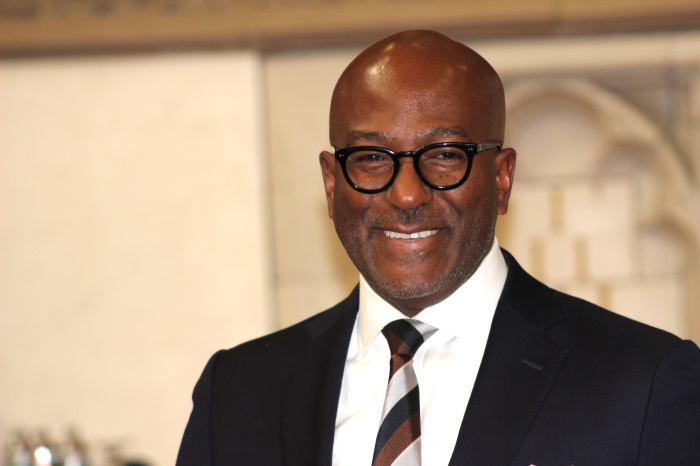
NEW YORK — While many churches across America have ditched dressing up for service in favor of a come as you are policy, at the historic Abyssinian Baptist Church, the congregation’s new leader, the Rev. Kevin R. Johnson, wants to make traditional worship with men in suits and women in dresses cool for the next generation.
“I want to make traditional church cool,” Johnson told The Christian Post inside his office at the storied church located at 132 Odell Clark Place in Harlem and founded at 1808 in lower Manhattan.
“Abyssinian, it will always be a traditional Baptist church,” he insisted while noting, “We have to make it engaging so that those who want this type of experience with Christ will feel like, ‘you know what? I can wear a tie and still be cool. I can wear a dress and still be cool.’”
Though he acknowledges the growing contemporary “come as you are” culture in churches today, including at Dare to Imagine in Philadelphia, Pennsylvania, which he founded in 2014, before his election as Abyssinian’s new leader in June, Johnson believes maintaining the megachurch’s “high culture” is an integral part of the congregation’s identity.
“I think Abyssinian is unique in the sense that Abyssinian represents the best of black culture, black tradition, black faith, black advocacy, and I would even say black future,” Johnson said.
He cited names of dignitaries and influential men of faith who worshiped at the church like noted German theologian Dietrich Bonhoeffer who taught Sunday School at Abyssinian and former President Barack Obama who worshiped at the church while studying at Columbia University in the 1980s.
"I'd just sit in the back and I'd listen to the choir and I'd listen to the sermon," Obama said of his Abyssinian experience in an interview with Newsweek. "There were times that I would just start tearing up listening to the choir and share that sense of release."
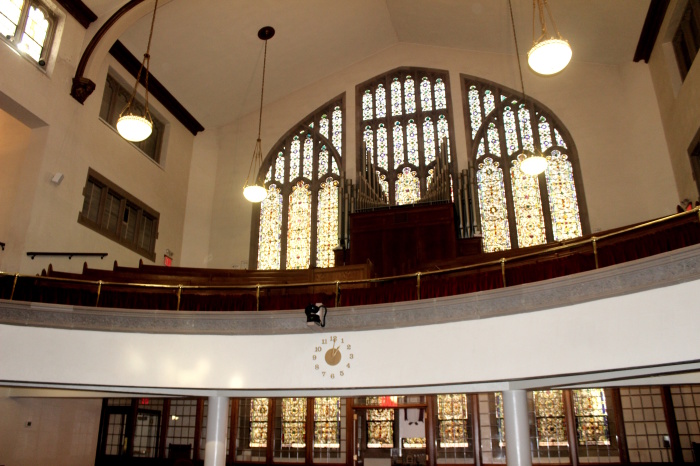
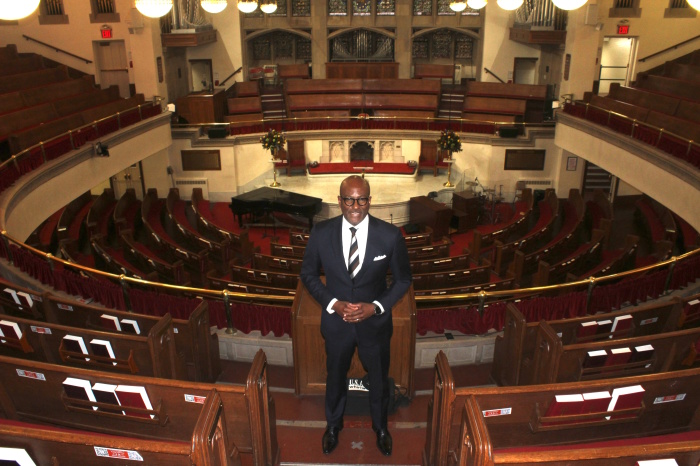
What Obama felt when he attended Abyssinian is what Johnson appears to experience in the hallowed sanctuary of the megachurch on Sundays too.
“There's something about a traditional setting that I still think has relevance. And every time I go out to the sanctuary on Sunday mornings and see the church full, it says to me that we're doing something,” he explained.
“When I look at the online numbers and see that we have each week 5,000 or so people across the world — while there's [the] contemporary [approach to worship] and trust me, I know both worlds very well — I still think there's an audience out there that says I can identify with those [traditional] people.”
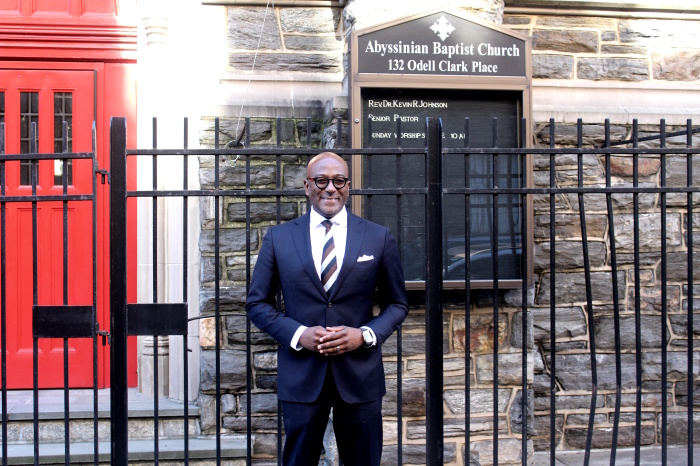
Unity
Keeping high culture alive isn’t the only thing Johnson has in his crosshairs at the megachurch. Since he started official duties in July, unity has been a big theme too.
“My focus has been on reviving the Abyssinian spirit. And there are four things that we're doing. The first quarter was focused on unity. So from July through September, I preached about unity, and now the focus is on love,” he said, pointing to plans to also focus on service and witness in the new year.
Lawsuits and headlines
It was a brisk afternoon when Johnson spoke to CP at his office on Wednesday. Had there been no headlines of an internal dispute among church members about his hiring this summer it would have been hard to tell if one even existed; or that he would need to preach a message of unity to heal the fractures triggered by it.
The Rev. Eboni Marshall Turman, a Yale Divinity School professor who made history when she became the youngest pastor ordained at Abyssinian in 2007, had hoped to be sitting in Johnson’s chair as the church’s first female pastor following the death of the Rev. Calvin O. Butts III. Butts died on Oct. 28, 2022, from pancreatic cancer after leading the church for three decades.
When she wasn’t named as a finalist for the position by the church’s search committee, Turman filed a federal lawsuit this year accusing the church and its search committee of gender discrimination. Abyssinian Baptist Church’s legal team has denied the allegations and have filed a motion to dismiss the lawsuit. In June, a judge ordered a stay of the discovery process in Turman’s lawsuit pending the outcome of the church’s motion to dismiss it.
Approximately two weeks after Johnson was officially installed on Sept. 29 as Abyssinian’s new pastor, four longtime members of the church — Kevin McGruder, Jasmine G. McFarlane-White, Clarence E. Ball, III, and Rev. C. Vernon Mason Sr. — asked a Manhattan judge to nullify the vote that led to Johnson’s “illegal” election along with other actions.
Abyssinian Baptist Church’s bylaws, they argue, require a new pastor to get votes from a majority of all church members who are eligible to vote — not just those who cast ballots. Johnson won his election with 672 yes votes, which amounts to 55.6% of those who voted but only 25.3% of 2,655 eligible voters.
“To appreciate why my fellow petitioners and I have taken these steps, it is important to understand that Abyssinian, a flagship Baptist Church in this country with this rich history, is not merely a church. Abyssinian is often looked to as a model of what could be and what should be as a preeminent institution of faith that has been at the forefront of social justice, equality, and civil rights for the Black community,” McGruder wrote in an op-ed for Black Star News on Thursday.
“If Abyssinian’s leadership establishes a dangerous blueprint, with this recent election of a pastor, that ignoring bylaws is acceptable, what type of precedence does this set for the governance of other Black Baptist churches going forward?”
The group of longtime members opposing Johnson’s installation as Abyssinian’s new pastor have also launched a GoFundMe campaign seeking to raise $200,000 to fund their lawsuit. As of Sunday morning they had raised over $42,900.
Despite the headlines and the lawsuits, Johnson, who says he has been preaching since the age of 16, said he is not troubled because he believes God called him to Abyssinian.
“I'm called to this work. When you're in ministry, it's kind of like saying to a firefighter, ’How bad was the fire?’ You're expected to go into fire,” Johnson said.
Johnson is a graduate of Morehouse College, which he says rejected him twice because his SAT scores had not been high enough. He eventually got accepted with the help of a strong recommendation from an influential connection. He would go on to earn a master’s degree from Union Theological Seminary and a doctorate in education from Columbia University.
He and his wife Kimya, who's a corporate attorney, have been married for nearly 27 years with three children — Lena, 16, Miles, 23, and Laila, 19. He proudly bares pictures of them in his office and on social media.
His most recent assignment at Abyssinian Baptist Church is his third tour of duty at the megachurch after serving as both an intern and an assistant pastor under Butts’ guidance who he also praises as a mentor.
“The most valuable lessons I've learned from him is to be humble and be faithful,” Johnson said of his time with Butts.
He explained that when he applied for the top job at Abyssinian, he did not assume or expect he would have been chosen because he was aware how coveted the position is.
The church said more than 40 candidates from diverse backgrounds across age, gender, and sexual orientations were considered for the senior pastor role. The Pulpit Search Committee considered applicants with a proven record of at least 12- to 15-plus years of successful church leadership; had pastoral experience as a senior pastor; a Master of Divinity degree and/or preferably, a doctorate degree from an accredited theological seminary. The candidates also had to have experience managing complex religious organizations.
Johnson had grown Dare to Imagine Church, Inc., from 20 people in his home to a congregation of now more than 1,500. He also founded and led the Dare to Imagine Community Development Corporation. But he maintains his arrival at Abyssinian is simply an obedient answer to God’s call.
“Everybody wants to be an Abyssinian,” he told CP. “What I will share with you is I prayed about it. What I would share with you is my prayer and my application and my cover letter. I said, ‘Lord, I'm trusting you in the process, because I knew that if I were called, that it would only be because of God. And so when the call came, to be quite honest, I said to my wife, ‘well, the Lord has spoken.’”
Johnson said he wasn’t troubled by Turman’s dispute of his selection for the senior pastor role at Abyssinian because he had lived through a similar experience at his home church, David Chapel Missionary Baptist Church in Austin, Texas, more than 30 years ago when the current leader, the Rev. Joseph C. Parker, was elected.
“Rev. Parker, my mentor, he became the pastor, and my home church, David Chapel, sued him three times,” Johnson recalled.
Parker who is also an attorney ultimately prevailed and remains the pastor of the church today after 33 years.
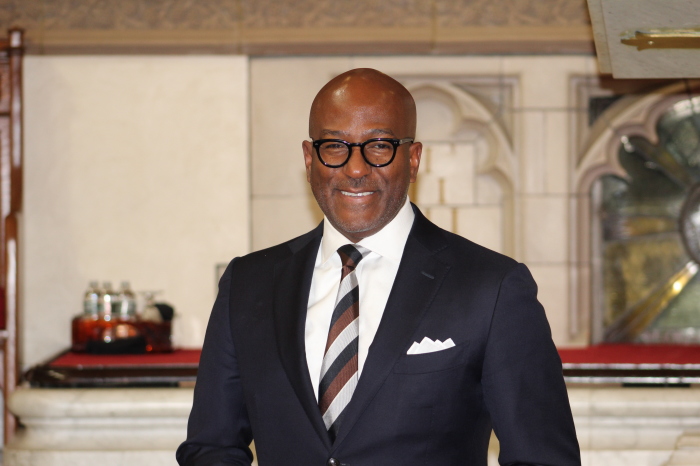
Revival
In addition to building unity at Abyssinian amid the testy leadership transition, Johnson has revived the church’s 20 ministries, including youth ministries, and he is investing in what he describes as small group meetups with congregants.
“In addition to preaching and teaching … we have started what I call pastor meetups, and that's been going extremely well,” he said.
“We have given people an opportunity, where they can host kind of a meet up at their house. Some people cook, some people have hors d'oeuvres, or whatever it may be, but I go to their home, and, you know, have an opportunity to get to know them, because when you're in the pulpit, you don't really have a chance to connect with people,” Johnson explained.
“As much as I love preaching, I love the smaller communities because it gives you an opportunity to connect with people. And what I really am loving about it is, I'm meeting people who I would not have had a chance to meet. And for this year, I have two a week.”
Johnson’s meetup calendar is already fully booked for this year.
Harlem has changed
He acknowledges how much the Harlem neighborhood he first served in at Abyssinian has been gentrified but he still sees challenges that need to be addressed.
“The demographics have totally shifted,” Johnson said. “The gentrification has obviously greatly impacted Harlem. They're more restaurants, I can tell you that, than before.
“What has not changed is, and it just looks differently, is the poverty and the pain. I recall, in Philadelphia, there's the Kensington section that the opioid crisis has greatly impacted, and you just see people walking around like zombies. I don't recall seeing that in the '90s when I was here, like how I see it now,” he noted. “That pains me, because that not only says that there's poverty, it says that there's an issue with education, says an issue with housing, because people are sleeping on the streets, but also, as an issue of mental health. And so, for me, those are things that we're going to have to look at as a church and as a development corporation, because we have to begin to address those matters for our people.”
Churches, in general, he said, have had to contend with various challenges as a result of the pandemic, including finding new ways to connect or reconnect with people who no longer believe it's necessary to attend a physical church to have an experience with God.
“The pandemic has changed everything. Being a pastor is already difficult. Just trying to get people to come into the house of God is very difficult,” Johnson said.
“The business model of church, before the pandemic, was in order to have an experience with God, you had to come to the church. What COVID did is that you don't have to come to church to have an encounter with God, an experience. With God, you can be home and have an encounter with God.
“People have gotten comfortable with the Zoom. And I think the challenge for many pastors is, how do you blend both? How do you turn it into a hybrid model where you do both in person and online? And I don't think every pastor is equipped, nor does every church have the resources to engage in this digital world,” he said.
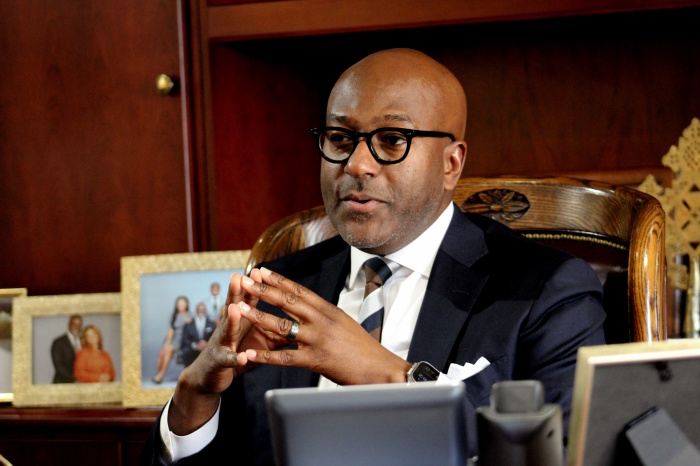
Prayer in public schools
Last year, New York City Mayor Eric Adams said it was a mistake to take prayer out of public schools and President-elect Donald Trump has pledged to reinstate the practice. When asked if he agreed with reinstating prayer in public schools, Johnson had no objection to the move but said he believes parents should be teaching their children to pray.
“I understood why he (Adams) said it. What I would say is, I am very firmly rooted in my faith, whether it is legislated to pray in school or not pray in school. To me, spiritual development is the responsibility of the parents. It's not the responsibility of the government or the school,” Johnson said.
“I share that with you because if we're expecting the government to teach our children to pray, then that's not good. It should be the mother and the father who is teaching that child to pray. Would I be against prayer [in public schools]? Absolutely no,” he said.
The megachurch pastor suggested, however, that reinstating prayer in public schools could become legally problematic if only Christian prayer is allowed.
On racial division in the Church
Commenting of the recently concluded presidential election where there was a clear racial divide in the support of Vice President Kamala Harris and President-elect Donald Trump between black and white Evangelical churches, Johnson believes that if Christian’s focus on being Matthew 25 believers divisions can be overcome.
“We really have to stop politicizing the Gospel,” Johnson said.
“If we really want to be the Church, then let's be the Matthew 25 Church. … I firmly believe that if we become that type of Church, then we won't see what just took place” in the election he said. “If you're not concerned about the least of these, then, in my opinion, you have a cheap Gospel. And a cheap Gospel is not the Gospel that I understand and it's not the Gospel that I preach about on Sunday.”
Contact: leonardo.blair@christianpost.com Follow Leonardo Blair on Twitter: @leoblair Follow Leonardo Blair on Facebook: LeoBlairChristianPost




























